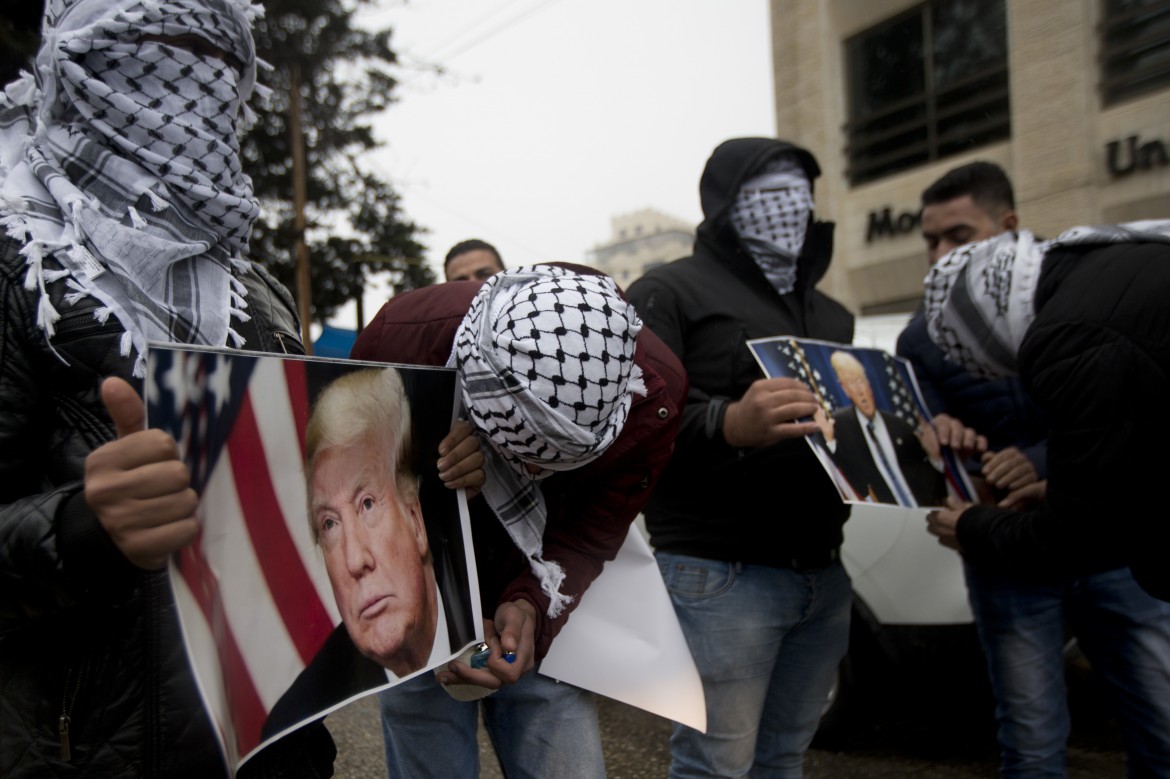Commentary
The ‘tribute to peace’ is a portent of war
Trump campaigned as an isolationist and a peacemaker. Instead, he has suddenly injected the Middle East with a new flashpoint that could lead to calamity.

Trump’s Christmastime announcement, made first to Abbas and confirmed Wednesday by the White House, is a violent and irresponsible act: Jerusalem is the capital of Israel. Next up — peace. The renowned “pacifist” is now insisting on moving the U.S. embassy from Tel Aviv to Jerusalem, de facto recognizing that it belongs wholly to the state of Israel. He is impudently sweeping under the rug the fact that international law considers the city as shared, with a western Israeli and an eastern Palestinian part.
Trump is blowing smoke with “humanitarian” claims: the new U.S. embassy “will be a magnificent tribute to peace,” he says. Instead, it makes the real balance of power perfectly clear, effectively voiding the increasingly unlikely promise of peace according to the slogan “two peoples, two states.” But Trump’s statement only comes as a culmination of much — too much — silence and complicity by the West, since all have contributed to erasing the Palestinian issue from the global agenda.
While the world looks away, a real tragedy is playing out every day in the lives of millions of people under military occupation in the West Bank, in Gaza — only formally “unoccupied” — and in East Jerusalem. Two U.N. resolutions passed after the 1967 War recognized these territories as Palestinian, calling on the occupying state to liberate them — a call that has been ignored.
We need only refer to the recent Security Council Resolution, No. 2334 of 2016, which reaffirmed the illegality of the Israeli settlements in East Jerusalem. Because in Jerusalem, for the people in the refugee camps — where Palestinians have been for 70 years — the apartheid regime, the expropriation of land and building areas, the deportations, the dividing wall, the checkpoints, the victims, and the many colonies sprouting up are all even more overwhelming.
But that which we call the “peace process,” which suffered a sharp blow in 1995 with the killing of the Israeli Labor Prime Minister Rabin by a Jewish extremist, has been inoperative for more than 10 years. It has remained so since the violent death of Arafat and the Palestinian division in 2006, when Hamas won the elections not only in Gaza but also in the West Bank — an event that happened, together with the further internal conflicts it brought out, because the peace negotiations remained a dead letter and the one left with the blame for its failure was the Palestinian National Authority.
In these 10 years, the Middle East has been ravaged by military coups and the new wars we caused, and Palestine was marked as an issue of secondary importance. Although Obama said to his audience at the University of Cairo in 2009 that he felt deeply the despair of the Palestinian people, still landless and homeless, that despair remained the same at the conclusion of his double term as president. It was 10 years in which Italy, from being a partner in the peace dialogue in the Middle East, has become an ally, even a military one, to the Israeli right-wing governments. While Macron, May, even Erdogan, raise their voices “in concern,” Italy, after Berlusconi, Renzi and Gentiloni, no longer has one. Instead, it is silent, and agrees to organize the Giro d’Italia starting from a Jerusalem “united” by Netanyahu’s blackmail.
Now people will say that Trump’s decision — which does away with the traditional postponement, signed by all previous U.S. presidents, of the effects of the American law that effectively recognizes Jerusalem as the capital of Israel — is ultimately a “realistic” and a merely “symbolic” one. They’ll say it will take time, two or three years, for the new U.S. embassy and “tribute to peace” to be built. (The “peace” of Trump’s strategy of chaos.) But all the while, the ones facing blackmail and threats are and will be the Palestinians.
Symbols are important, if not decisive, both in the West — what about Christian Jerusalem, a faith held by many Palestinians? — and in the Middle East, where we take for granted that our wars, which have led to devastated countries and the rise of Islamic fundamentalism, are in fact over. The occupation of the “holy lands of Islam” (the U.S. military bases in Saudi Arabia, and Jerusalem-Al Quds) was in fact the ideological fulcrum for the birth of al-Qaeda — a symbolism capable of unifying the Muslim world, both Shia and Sunni.
We know only one thing for sure: Trump’s announcement put a forgotten reality under the spotlight once again, in a Middle East crisscrossed by bloody conflicts that have become permanent. And the only times when the Palestinians actually managed to make themselves heard was when their precious unity and their anger, which had been silently growing — as might happen again this time — suddenly broke through the surface, like lava, with the political revolt of the Intifada.
Originally published at https://ilmanifesto.it/una-scelta-per-una-nuova-guerra/ on 2017-12-07
